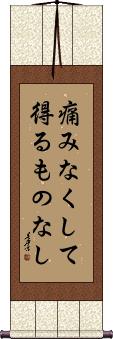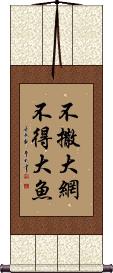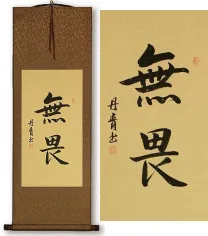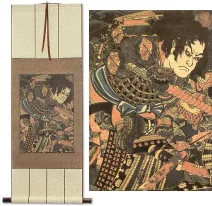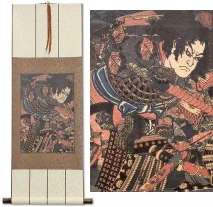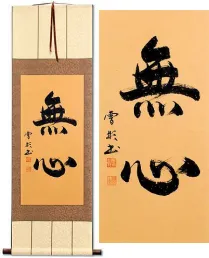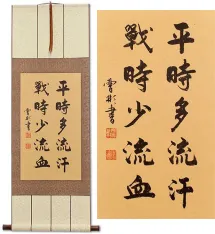Many custom options...
And formats...

No Pain No Gain in Chinese / Japanese...
Buy a No Pain No Gain calligraphy wall scroll here!
Personalize your custom “No Pain No Gain” project by clicking the button next to your favorite “No Pain No Gain” title below...
No Pain No Gain
Literally: No Pain, No Strength
No Pain No Gain
痛みなくして得るものなし is a Japanese phrase that means “no pain, no gain.”
This suggests that with pain, a gain must follow.
The pain Kanji here can also be translated as sorrow or suffering. The gain can also mean profit, advantage, or benefit. In the Japanese Buddhist context, that gain Kanji can mean rebirth in paradise, entering nirvana.
The character breakdown:
痛みなく (itami naku) pain; ache; sore; grief; distress. The naku part adds the meaning of “a lot of” or “extended”
して (shite) and then. (indicates a causative expression; acts as a connective particle)
得る (eru) to get; to acquire; to obtain; to procure; to earn; to win; to gain; to secure; to attain.
もの (mono) conjunctive particle indicating a cause or reason.
なし (nashi) none of; -less; without; no.
Note: Because this selection contains some special Japanese Hiragana characters, it should be written by a Japanese calligrapher.
Without a big net, how can you catch fish?
不撒大網不得大魚 is a Chinese proverb that literally translates as: [if one does] not cast a big net, [one can] not get big fish.
Figuratively, this means: One cannot make great accomplishments without making great efforts or taking great pains.
This is sort of the fishing version of, “No pain, no gain.”
There is no pleasure without pain
No pain, no gain
This in-stock artwork might be what you are looking for, and ships right away...
Gallery Price: $108.00
Your Price: $59.88
Gallery Price: $108.00
Your Price: $59.88
Gallery Price: $79.00
Your Price: $43.88
Gallery Price: $61.00
Your Price: $33.88
Gallery Price: $61.00
Your Price: $33.88
Gallery Price: $220.00
Your Price: $112.88
Not the results for no pain no gain that you were looking for?
Below are some entries from our dictionary that may match your no pain no gain search...
| Characters If shown, 2nd row is Simp. Chinese |
Pronunciation Romanization |
Simple Dictionary Definition |
苦は楽の種 see styles |
kuharakunotane くはらくのたね |
More info & calligraphy: There is no pleasure without pain |
不勞無獲 不劳无获 see styles |
bù láo wú huò bu4 lao2 wu2 huo4 pu lao wu huo |
no pain, no gain (idiom) |
労多くして功少なし see styles |
rouookushitekousukunashi / roookushitekosukunashi ろうおおくしてこうすくなし |
(expression) (idiom) all pain and no gain; lots of pain and not much gain |
百害あって一利なし see styles |
hyakugaiatteichirinashi / hyakugaiattechirinashi ひゃくがいあっていちりなし |
(expression) all pain, no gain; doing no good and a lot of harm; having no redeeming features; being a complete disadvantage; a hundred harms and not a single gain |
百害あって一利無し see styles |
hyakugaiatteichirinashi / hyakugaiattechirinashi ひゃくがいあっていちりなし |
(expression) all pain, no gain; doing no good and a lot of harm; having no redeeming features; being a complete disadvantage; a hundred harms and not a single gain |
吃得苦中苦,方為人上人 吃得苦中苦,方为人上人 |
chī dé kǔ zhōng kǔ , fāng wéi rén shàng rén chi1 de2 ku3 zhong1 ku3 , fang1 wei2 ren2 shang4 ren2 ch`ih te k`u chung k`u , fang wei jen shang jen chih te ku chung ku , fang wei jen shang jen |
one cannot achieve glory and wealth without having been through trials and tribulations (proverb); no pain, no gain |
Variations: |
kuarebarakuari くあればらくあり |
(expression) (proverb) no pain, no gain; no cross, no crown |
Variations: |
hyakugaiatteichirinashi / hyakugaiattechirinashi ひゃくがいあっていちりなし |
(expression) (idiom) all pain, no gain; doing no good and a lot of harm; having no redeeming features; being a complete disadvantage; a hundred harms and not a single gain |
The following table may be helpful for those studying Chinese or Japanese...
| Title | Characters | Romaji (Romanized Japanese) | Various forms of Romanized Chinese | |
| No Pain No Gain | 不痛不強 不痛不强 | bú tòng bù qiáng bu2 tong4 bu4 qiang2 bu tong bu qiang butongbuqiang | pu t`ung pu ch`iang putungpuchiang pu tung pu chiang |
|
| No Pain No Gain | 痛みなくして得るものなし | itami naku shite erumono wa nashi | ||
| Without a big net, how can you catch fish? | 不撒大網不得大魚 不撒大网不得大鱼 | bù sā dà wǎng bù dé dà yú bu4 sa1 da4 wang3 bu4 de2 da4 yu2 bu sa da wang bu de da yu busadawangbudedayu | pu sa ta wang pu te ta yü pusatawangputetayü |
|
| There is no pleasure without pain | 苦は楽の種 | ku wa raku no tane kuwarakunotane | ||
| In some entries above you will see that characters have different versions above and below a line. In these cases, the characters above the line are Traditional Chinese, while the ones below are Simplified Chinese. | ||||
Successful Chinese Character and Japanese Kanji calligraphy searches within the last few hours...

